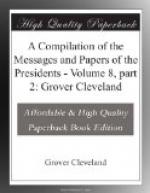This Government has received official notice that the revised international regulations for preventing collisions at sea have been adopted by all the leading maritime powers except the United States, and came into force on the 1st of September last. For the due protection of our shipping interests the provisions of our statutes should at once be brought into conformity with these regulations.
The question of securing to authors, composers, and artists copyright privileges in this country in return for reciprocal rights abroad is one that may justly challenge your attention. It is true that conventions will be necessary for fully accomplishing this result; but until Congress shall by statute fix the extent to which foreign holders of copyright shall be here privileged it has been deemed inadvisable to negotiate such conventions. For this reason the United States were not represented at the recent conference at Berne.
I recommend that the scope of the neutrality laws of the United States be so enlarged as to cover all patent acts of hostility committed in our territory and aimed against the peace of a friendly nation. Existing statutes prohibit the fitting out of armed expeditions and restrict the shipment of explosives, though the enactments in the latter respect were not framed with regard to international obligations, but simply for the protection of passenger travel. All these statutes were intended to meet special emergencies that had already arisen. Other emergencies have arisen since, and modern ingenuity supplies means for the organization of hostilities without open resort to armed vessels or to filibustering parties.
I see no reason why overt preparations in this country for the commission of criminal acts such as are here under consideration should not be alike punishable whether such acts are intended to be committed in our own country or in a foreign country with which we are at peace.
The prompt and thorough treatment of this question is one which intimately concerns the national honor.
Our existing naturalization laws also need revision. Those sections relating to persons residing within the limits of the United States in 1795 and 1798 have now only a historical interest. Section 2172, recognizing the citizenship of the children of naturalized parents, is ambiguous in its terms and partly obsolete. There are special provisions of law favoring the naturalization of those who serve in the Army or in merchant vessels, while no similar privileges are granted those who serve in the Navy or the Marine Corps.
“An uniform rule of naturalization” such as the Constitution contemplates should, among other things, clearly define the status of persons born within the United States subject to a foreign power (section 1992) and of minor children of fathers who have declared their intention to become citizens but have failed to perfect their naturalization. It might be wise to provide for a central bureau of




